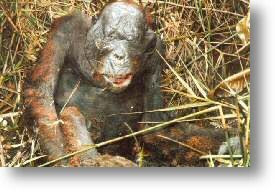
More than ever, the actions of individuals are having collective and far-reaching repercussions. There has recently been a series on BBC 1 detailing the struggles of orang-utans in Borneo and the efforts of an organisation to save them. Documentaries such as these have followed a long line of programmes showing the life of the orang-utan within its own world but have sadly become less joyous as they are now intended to highlight, to us, the damage we have done through consumerism. ‘Orang-utan Diary’ now shows the struggle this species has to go through as a result of their homes being rooted up for palm oil plantations that are needed to satisfy western consumers’ demand for lifestyle enhancing products such as soap, Supernoodles and even some breads. As they attempt to survive through our greed, they are often killed for stealing from farmers’ crops, leaving young babies to fend for themselves. This story is all too common and orang-utan babies essentially end up in the centre, which cares and rescues them. Furthermore, orang-utans are naturally solitary beings with large territories over which they hunt for food but are now resigned to living with 600 of their kind who are still waiting to be released back into safer patches of land that will not be affected by milling and farming.

PALM OIL VICTIM "When we saw the big male approaching our camp we were afraid. So we quickly ran over to him and doused him with petrol and set him on fire.” Fermin, Bulldozer driver in clearance camp
 If you care to adopt an orang-utan out of around 600 living at the centre, here's the site: http://www.savetheorangutan.co.uk/diary/
If you care to adopt an orang-utan out of around 600 living at the centre, here's the site: http://www.savetheorangutan.co.uk/diary/
No comments:
Post a Comment
Note: only a member of this blog may post a comment.